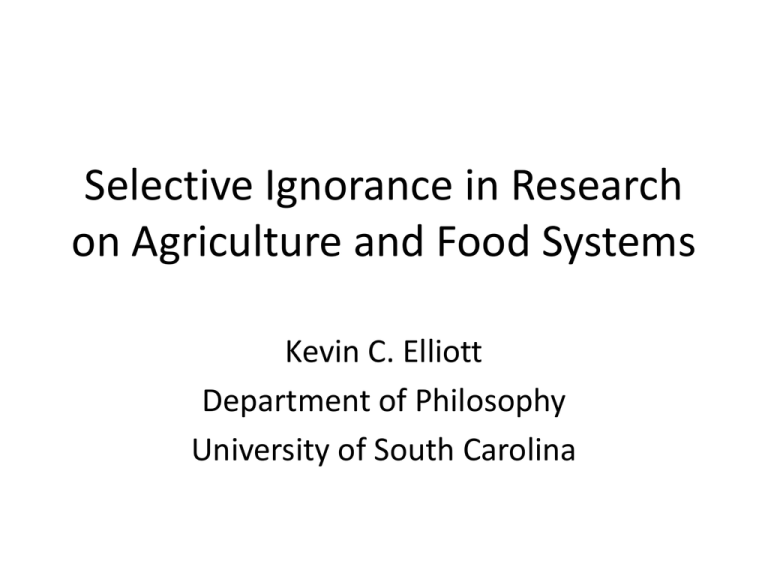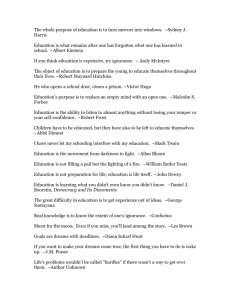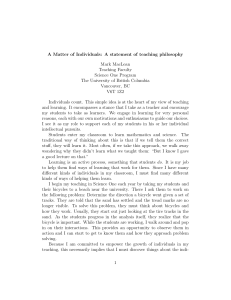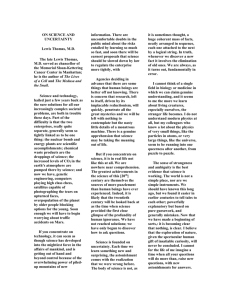Selective Ignorance in Research on Agriculture and Food Systems Kevin C. Elliott
advertisement

Selective Ignorance in Research on Agriculture and Food Systems Kevin C. Elliott Department of Philosophy University of South Carolina Overview • “Ignorance” or “agnotology” as a concept for reflecting on scientific practice • My current scholarship on ignorance • Examples and suggestions for collaboration related to this concept Ignorance • Scholarship on this topic typically emphasizes that ignorance should not be brushed aside as a simple or unimportant phenomenon: – Sometimes powerful groups don’t want us to know about particular topics – Sometimes there are important institutional factors that contribute to our ignorance – Sometimes our ignorance is the result of what Miranda Fricker calls testimonial or hermeneutical injustice – Sometimes particular sorts of ignorance systematically benefit some groups while disadvantaging others Ignorance • A variety of scholars have recently begun to explore this topic: Ignorance • Historian Robert Proctor offers a simple taxonomy of ignorance to help launch further research on the topic: – Ignorance as “native state” or starting point – Ignorance as lost realm or selective choice, i.e., selective ignorance – Ignorance as strategic ploy or active construct Selective Ignorance • I’ve been thinking about Proctor’s second category— selective ignorance: – “We look here rather than there; we have the predator’s fovea (versus the indiscriminate watchfulness of prey), and the decision to focus on this is therefore invariably a choice to ignore that. Ignorance is a product of inattention, and since we cannot study all things, some by necessity—almost all, in fact—must be left out.” Selective Ignorance • The first main point of my scholarship: – It’s tempting to think that selective ignorance is just a matter of studying some topics and ignoring others, but I’m interested in the range of often subtle research choices that result in collecting some forms of information (even about a single phenomenon or research domain) rather than others – These choices include questions, metrics or standards, language and concepts, research strategies, technological decisions, and approaches to information dissemination Selective Ignorance • The second main point of my scholarship: – These choices can significantly influence our understandings of phenomena, which can in turn promote some socially important policies or perspectives or value systems rather than others – For example, in the context of agriculture and food systems, we can be left comparatively ignorant of important environmental problems as well as potential solutions Some Quick Examples From… - Initiated in 2002 by the World Bank and the Food and Agriculture Organization (FAO) and completed in 2008 Contributors to Selective Ignorance • Choice of questions – IAASTD emphasizes that previous agricultural research has asked primarily how to increase production of single components (SDM, p. 16), whereas the report encourages agricultural research that asks how to achieve “the reduction of hunger and poverty, the improvement of rural livelihoods and human health, and facilitating equitable, socially, environmentally and economically sustainable development … while increasing agricultural production” (SDM, p. 1) • Previous agricultural research left us ignorant of interconnections between ag and fisheries, forestry, wild resources, and the social context Contributors to Selective Ignorance • Metrics, measures, standards: metrics for evaluating agriculture and agricultural research can hide or leave out significant information – “Measurements of returns to investments [in ag research] require indices that give more information than GDP, and that are sensitive to environmental and equity gains” (ES, p. 7) – Researchers are being encouraged to incorporate more sophisticated measures of agricultural success, including people’s access to micronutrients (not just calorie intake), as well as the climate mitigation and biodiversity preservation of ag systems (SDM, p. 21) Contributors to Selective Ignorance • Technological Applications – IAASTD raises the worry that GM technology and future plant breeding will not address locally pressing problems, in part because intellectual property rights will inhibit participatory research projects: • “[T]he increasing trend toward seed patenting and IPR over genetic material has given rise to concern … that … the space for PPB [participatory plant breeding] may be closing” (p. 66) • “In developing countries especially, instruments such as patents may … restrict experimentation by the individual farmer or public researcher.... Biotechnologies should be used to maintain local expertise and germplasm so that the capacity for further research resides with the local community” (ES, p. 8) Conclusions • In other words, a range of scientific judgments (e.g., about questions, metrics, language, research strategies, technological applications, and information dissemination) can promote selective ignorance about important phenomena • In agriculture, we’ve seen that this can result in: – Ignorance about the impacts of our activities on specific features of the environment or on people’s livelihoods or cultural practices – Ignorance about the range of promising alternative approaches and how best to implement them



